By B. C. Thimmaiah
Not many Government Officers holding high positions are ready to swap his or her work at the desk for muddy boots. But Mysuru has a Deputy Commissioner Abhiram G. Sankar, who dons many roles apart from being the head of the District. He is a nature-lover, an avid birder, photographer and a gardener with an intimate knowledge of flowering and fruiting plants. Thanks to his initiatives and an inherent love for nature, the DC’s Residence on Hunsur Road is a thriving organic farm and a green haven for over 93 bird species.
The DC’s Residence, in an area of two acres with the bungalow at the centre, has more than 2,000 trees. Abhiram took over office in April 2018 and ever since he has been meticulously planning to make his house a green space and with active support from his wife Ramya Shankar, who is also a nature-lover, he has converted the barren space filled with tall grass into a lush green campus amidst the hustle and bustle of the city.
There are over 100 species of plants and evergreen trees, including the ones that were planted and grown before, inside the compound with attractive walkways in the middle which has been made out of discarded interlocking tiles and bricks. Strictly adhering to the policy of creating wealth out of waste, many new saplings including a host of medicinal plants have been planted and the fruiting plants are expected to bear fruits in some years and will feed both humans and birds for generations to come.
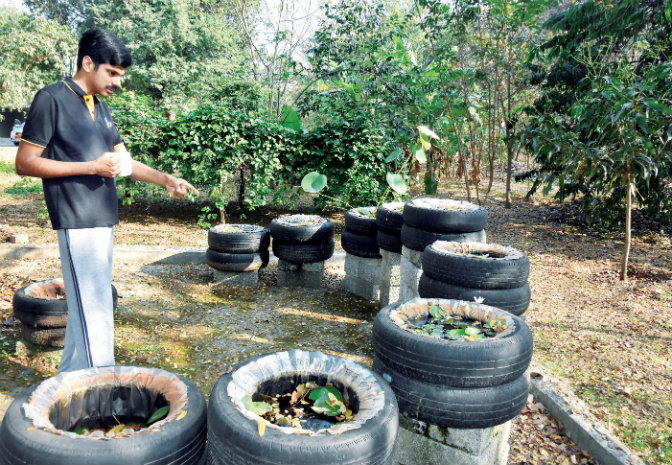
Buzz of bees, chirp of birds
Complete with small water points that have been designed with old tyres and discarded concrete round structures that were earlier used to set fire to dry leaves and twigs, the compound now sports small lotus ponds with a lot of lilies and guppy fish to feast on mosquito larvae. There are many water tubs that quench the thirst of visiting birds, squirrels, peacocks and bats. Attractive and designer garden landscapes have also been made using broken tiles and flowering saplings have been planted in them where usually a buzz of bees is heard.
Medicinal plants
There is an exclusive section for medicinal plants inside the compound by the side of a native bamboo bush and there are over 30 species of herbs brought from various nurseries. Along with plants, seeds were procured from different places and sowed inside the compound. These medicinal plants were sourced and brought in with the help of Botanist Sampath.
Some of the tree species inside are Rain Tree, Mango, Peepal, Banyan, Cannon Ball Tree, Champa, Cluster Fig, Guava, Jackfruit, Jamoon, Pomegranate, Teak, Water Apple, White Frangipani, Amla, Wood Apple, Banana, Papaya, Anjeer, Tapioca, African Tulip Tree, Ceylon Date Palm, Sita Ashok, Carambola, Star Fruit, Tamarind, Drumsticks, Gulmohar, Mahua, Ramphal, Indian Rosewood, Indian Honge, Mulberry, Avocado (Butter Fruit, Weeping Fig, Benjamin Fig, Singapore Cherry, Indian Soapberry, Peacock Flower or Barbados Pride, Fern Tree, Powder Puff, Karihuli, Orchid Tree, Bottle Brush Barbados Cherry, Lakshmana Phal, Sri Lankan Ironwood or Indian Rose Chestnut. The list is exhaustive and 93 flowering and fruiting trees have been documented along with their scientific names.

Vegetable Garden
When Abhiram and his wife shifted to the bungalow, they got the entire rough land that had construction debris, hard soil and tall grass cleared and tilled and the mud was softened. Fertile soil was brought from outside and saplings were planted. The place is a mini forest now and Zoo manure is used to keep the plants healthy. The cultivation is completely organic with neem-based pesticides and there is a host of vegetables grown inside the compound including snake gourd, ladies finger, green leaves, sweet pumpkins, mint leaves, tomatoes and bottle gourd. These vegetables make their way into Deputy Commissioner’s kitchen and also distributed among guests and gardeners.
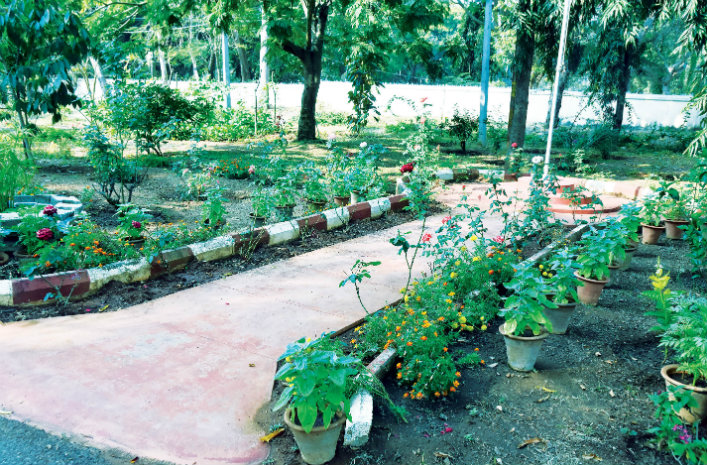
Grew amidst nature
Hailing from lush green environs of Attingal village in Thiruvananthapuram in Kerala, Abhiram Sankar grew amidst nature and he developed a passion for wildlife and birds at a very young age. “During all summer holidays I used to go to my grandparents’ place at Sundarapandyapuram village on the Kerala-Tamil Nadu border that is bounded by green surroundings and my grandfather’s house was on the edge of a pristine lake and was a place for the birds to roost and wildlife to quench thirst. I continued this keen interest in nature throughout my education and profession,” he says.
Born to Girisankar and Meena Sankar, he had his primary schooling from Sree Chithira Thirunal Residential Central School, Kunnathukal, Thiruvananthapuram and completed his secondary schooling from Arya Central School. He then did his B.Tech in Computer Science from Thangal Kunju Musaliar (TKM) College of Engineering, Kollam in Kerala. He secured fourth rank in the 2011 All India Civil Services Examination and he topped the Civil Services list in Kerala. And he did it in his first attempt.
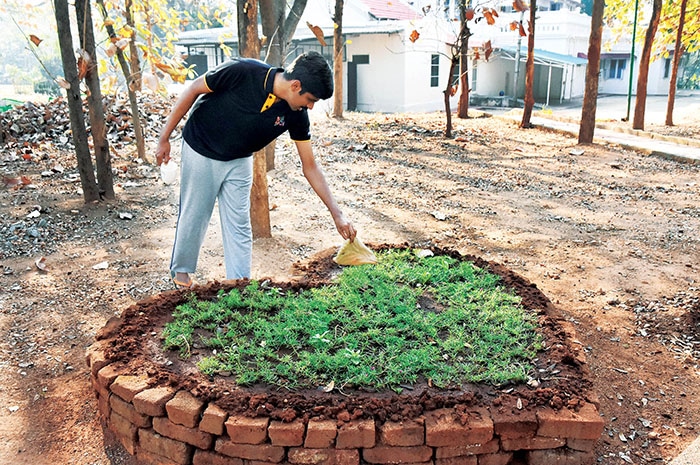
A complete natural cycle
Many bird-friendly saplings were planted inside the DC’s Residence. “We see the results now as birds are roosting on such plants. A favourable environment was created for birds and pollinating flowering trees were planted. We have even retained dead trees without destroying them as insects, beetles and termites feed on them and in turn attracts birds like Barbets and Woodpeckers. So the natural cycle of flowering, pollination, fruiting, dead wood, insect feeding and birds feasting on them is complete here,” Abhiram says.
“We are slowly destroying insect population and we are not realising the crisis situation arising out of this. The insect world is crucial for human survival and we should wake up before it is too late,” the naturalist in him warns. Both Abhiram and Ramya devote their free time to nature and pick up plants from wherever they visit. Even guests to his home are given saplings as mementoes. “I do not accept gifts and instead tell event organisers to gift me saplings so that they can be nurtured for the future generations,” he says.
A stickler for dividing his Office time and home time into water-tight compartments, Abhiram well-guards his private space. “I have friends from seven-year-olds to eighty-year-olds and find time to interact with them, birding, photography and also gardening. The fountain in front of DC’s Residence was full of algae and there was stinky water muck inside. We have filled soil in it and have an ornamental garden there now,” he says, showing the flora-fountain now.
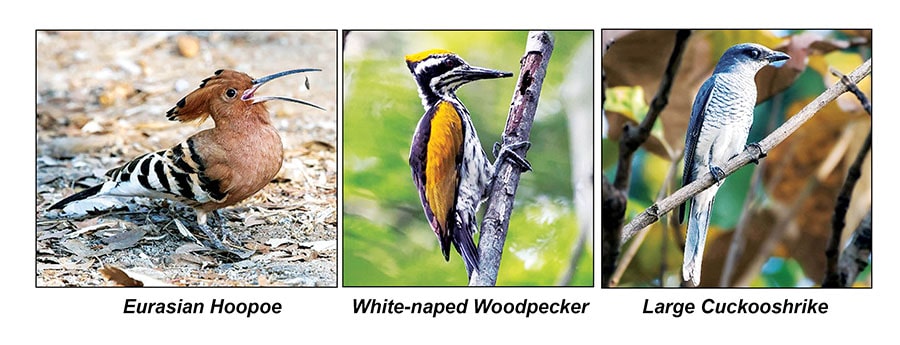
DC’s bird clicks from his garden
Abhiram is familiar with the fragile ecosystem and biodiversity of Western Ghats and he can identify distinct bird calls and quickly name the species even after dark. Constant practice has given him an added advantage. He began formal photography in 2012 and maintains a list of birds in the e-bird App developed by Cornell University. He has uploaded over 654 bird species in the App that collates information in the form of checklists of birds and their habitats, archive it and freely share it to power new data-driven approaches to science, conservation and education.
“The best thing about birding is that one need not travel to an exotic location to document birds. Just step out of your home and you will see birds. Birds are there everywhere, one need to learn to identify them,” he says.
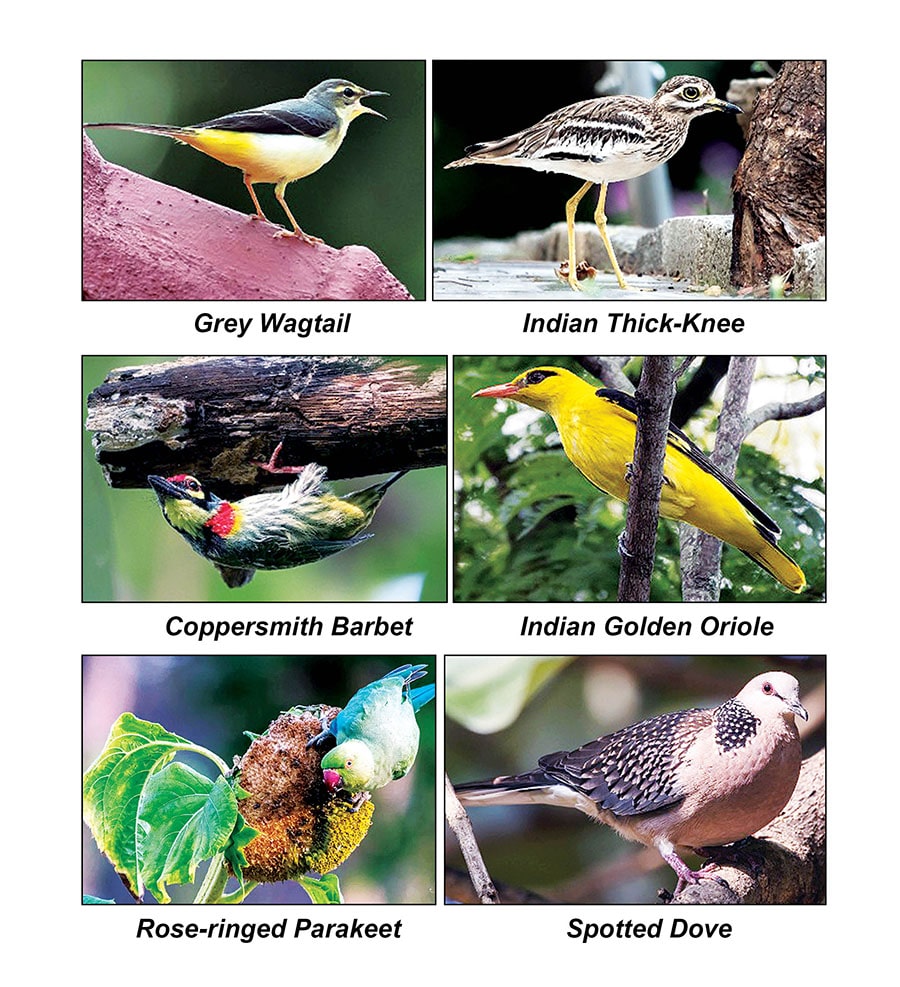
First to sight a Large Cuckooshrike
He has photographed over 93 species of birds at the DC’s Residence including rare owls which he heard only twice. Abhiram was the first person in Mysuru to sight a Large Cuckooshrike (Coracina macei), a species of Cuckooshrike found in the Indian Subcontinent. “I am attuned to bird sounds,” he says.
Two giant trees inside the DC’s Residence compound, one at the side and one right in front of the bungalow, have been added to the Heritage Trees list. They are Ficus Benjamina and Bombax pentandra (white silk-cotton tree).
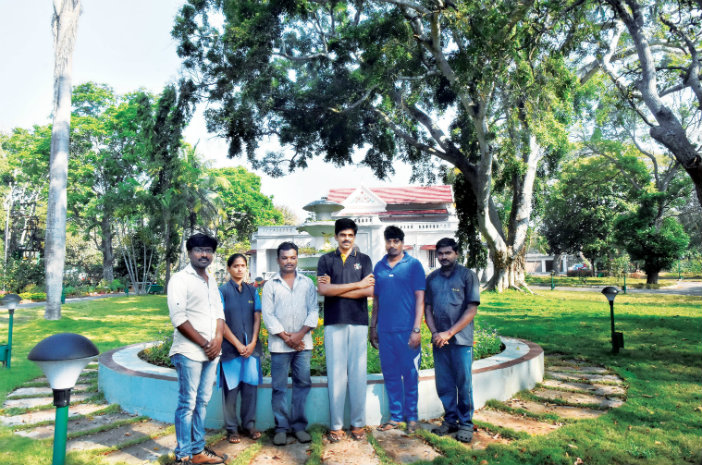
Contribution of gardeners
Abhiram Sankar does not fail to recall the contribution of his gardeners in keeping the DC’s Residence compound green, clean and bustling with birds and bees.
His chief gardener is Sunil who implements the ideas given by the Deputy Commissioner and his wife. Sunil is ably assisted by other gardeners Rangaswamy, Sheela, Jagadeesh and Devaraj. “We could not achieve this today without the help of these gardeners who treat plants like their babies,” Abhiram says.
Abhiram’s next task is to fix the names of the plants along with their scientific (taxonomy) classification. “I want to do this as a ready reference material so that people realise the importance, rarity and uniqueness of plant species. But I do not know when I will find time for this,” he signs off before he rushes to a video-conference at his Office.



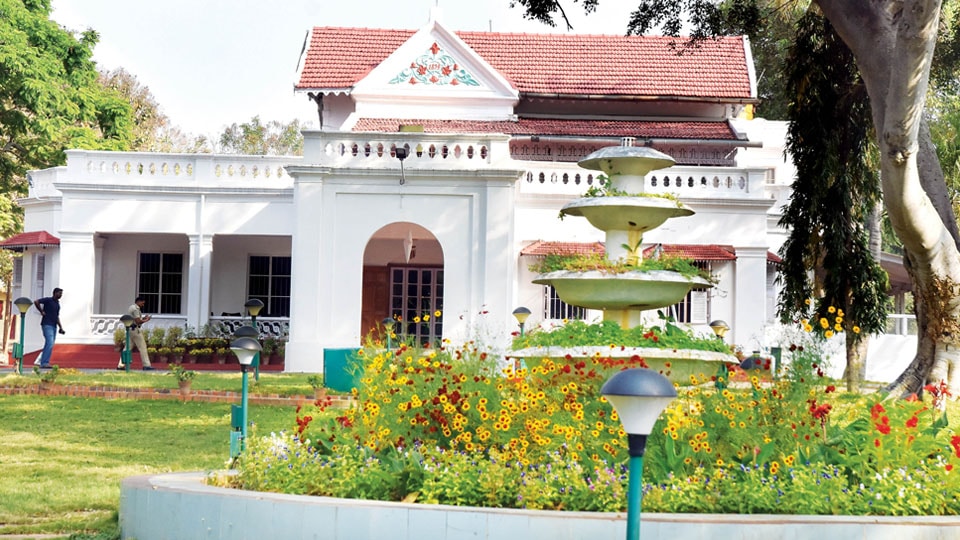

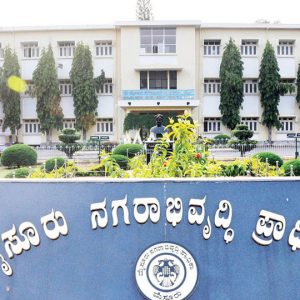
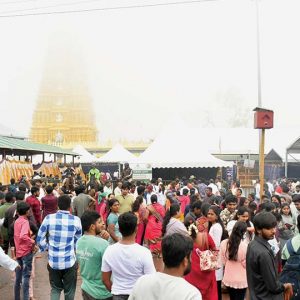

Recent Comments